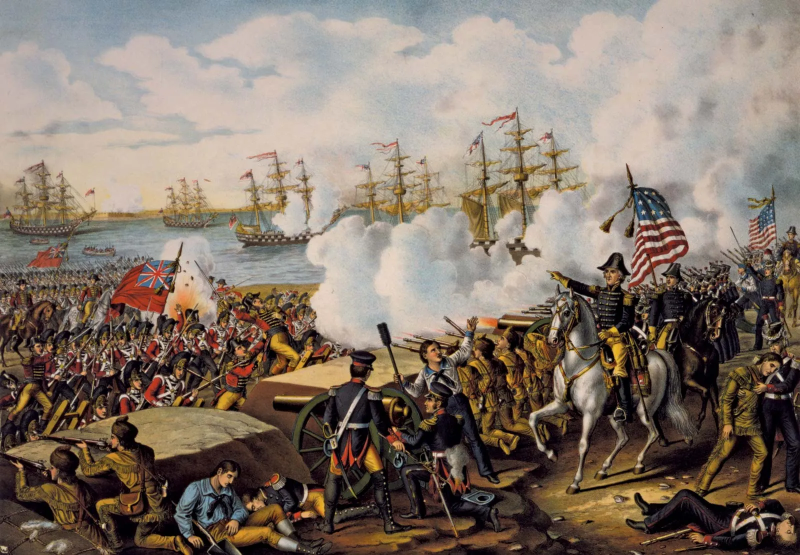Johnny Horton, Battle of New Orleans

Unlike many American folk songs we know well—oftenwritten in the era of Dixie folks—thissong actually came about much later, even though it tells the story of the Warof 1812 (1812–1815), America’s “Second War of Independence.” It was written in1936 by Jimmy Driftwood. Perhaps the most interesting thing about its creationis the reason behind it: Driftwood, the principal of a school in Arkansas, hada passion for history and wanted his students to learn and remember it moreeasily. To that end, he personally wrote many songs like this one, includingThe Battle of New Orleans. In the 1950s, Driftwood was “discovered” by musicianDon Warden, who helped him record and publish twelve of the songs he hadoriginally written for his students.

Like many American folk songs, the tune forthis song existed long before the lyrics were written. In fact, the melody’sorigin lies in the 8th of January, originally called Jackson’s Victory afterthe general celebrated in the song—which commemorates the date of the Battle ofNew Orleans. The composer is unknown, as is the exact time of its creation, butit was likely written shortly after the battle itself. The style,unsurprisingly, is classic American country music. The version I’m referring tohere is probably the most famous: Johnny Horton’s recording of The Battle ofNew Orleans at Bradley Studios in Nashville. In 1959, this version topped theBillboard Hot 100 chart—a list so well-known in American pop culture that itspopularity speaks for itself. As with many such songs, Horton’s recordingslightly altered the original melody, most notably starting with a themeborrowed from “Dixie’s Land” rather than the original opening.

The song narrates the Battle of New Orleansfrom the American soldiers’ perspective, in a highly dramatic and sometimeshumorous way—especially in the exaggerated bit about the alligator, which neverfails to get a laugh. Perhaps because Driftwood was from Arkansas (part of thecultural “Dixie” South), the song, like many Southern folk tunes, carries arather aggressive tone, portraying the British in a rather pitiful light. Thelyrics repeatedly mention General Andrew Jackson, the central figure of the battle—justas in “The Southern Wagon”. One noteworthy phrase in the song is “OldHickory,” referring to Jackson himself. He was a man of significant historicalimportance: he had fought alongside George Washington in the AmericanRevolutionary War, led troops in the Creek War of 1813–1814, and defeated theBritish in the 1815 Battle of New Orleans, becoming a national hero. Thisvictory earned him the nickname “Old Hickory,” symbolizing his strength andtoughness. Jackson would later become the seventh president of the UnitedStates—a true rise to the pinnacle of power.

The Battle of New Orleans was the final majorengagement of the War of 1812, fought between American/Continental Army forcesunder Colonel (later General) Andrew Jackson and British forces commanded byMajor General Sir Edward Pakenham. In August 1814, Britain and the UnitedStates began negotiations to end the two-year-long conflict. However, HenryBathurst, the British Secretary of State for War and the Colonies, doubtedAmerica’s sincerity and ordered Pakenham to ignore any news of peace andcontinue expanding British gains. Around the same time, the Admiralty receivedintelligence suggesting that capturing New Orleans would hasten a decisiveBritish victory. While Britain had its own reasons for the assault, the truthis that this battle should never have happened at all: on October 24, the U.S.and Britain had already signed the Treaty of Ghent in Belgium. Due to thelimitations of communication at the time, news of the treaty had not yetreached the United States, so American troops unknowingly fought a war that wastechnically over.
The battle was brutal, but it was also atremendous victory for the Americans: British casualties numbered around 2,037,compared to just 71 on the American side. Many high-ranking British officers,including Pakenham himself, were killed. As Jackson would later reflect: “IfPakenham and his 10,000 crack troops had won that battle, the British wouldhave been unstoppable, and they would have had every reason to tear up theTreaty of Ghent and keep fighting.”